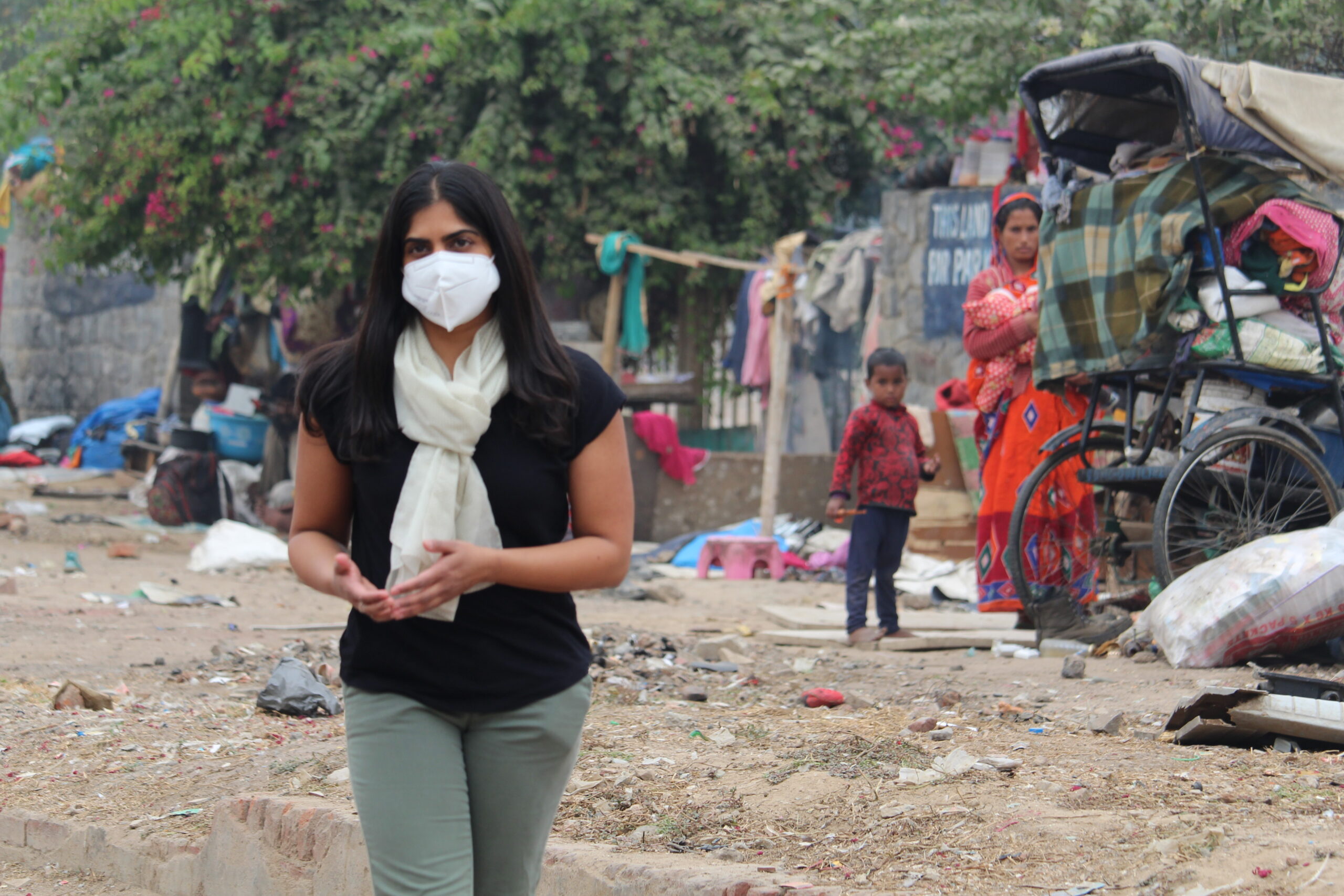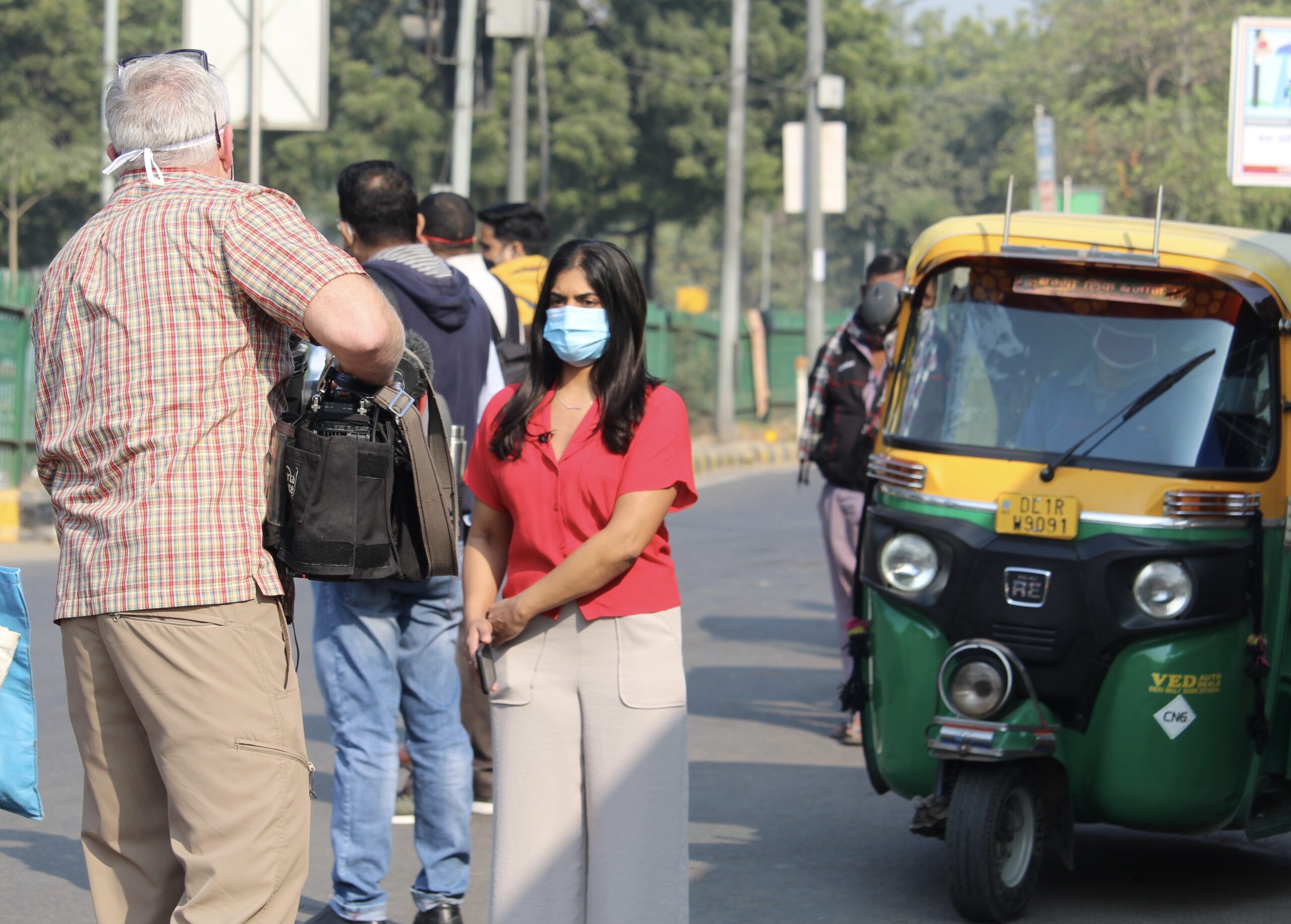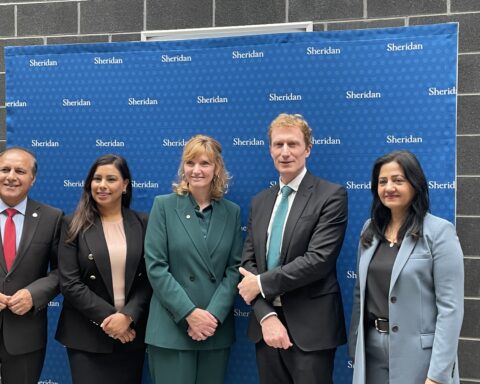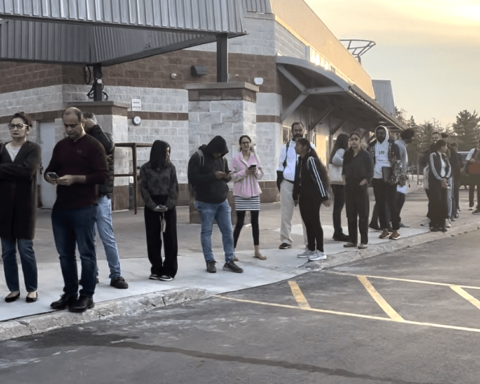Salimah Shivji would rather be in India right now, covering the ongoing farmers’ protests, a historical movement by farmers against three new farm laws recently passed by the Indian government.
The senior CBC reporter who reports for the public broadcaster from Parliament Hill has a new posting she’s palpably excited about. In October 2020, CBC’s Editor in Chief of News, Brodie Fenlon tweeted, “…[W]e plan to establish a permanent @CBCNews bureau in India. The process will take several months, but I’m so pleased that reporter Salimah Shivji and video producer Glen Kugelstadt have agreed to be our two-person team there, likely based in Mumbai.”
While the bureau in Mumbai is yet to be set up, Shivji has already been on the ground, filing reports from India where she was this past December. Currently waiting for a renewal of her journalist visa, she spoke with NCM on what this opportunity means for the CBC and for her personally, as well as for the big Indo-Canadian diaspora community.
Excerpts from an exclusive, edited interview:
Why India and why now?
The CBC is very excited about setting up the India bureau. I think it’s always been in the back of their minds; they have always wanted to cover India more as for people like you and me, both from an Indian background in Canada. It’s important with a big and diverse diaspora community in Canada. More Indian students now study in Canada than from any other nation. As the community grows, so do the ties between Canada and India, so this initiative has been in the works for some time. But the process of setting up a bureau takes time. There are visa issues, and we’re in the middle of a pandemic. So in terms of timing, it’s still unclear when exactly we’ll be on the ground, it might be a few more months.
At a time when it’s difficult for media outlets to open foreign bureaus abroad, this is excellent news, especially when other outlets are closing bureaus in different parts of the world. I think it shows how India is important for the CBC as a network. You can tell stories remotely, but the stories that you can tell when you’re on the ground are far better and much more powerful.
What does this posting mean to you personally?
This is an exciting opportunity regardless of my background, but when you get the chance to go back to where your roots are, that’s a phenomenal feeling (chuckles). You’re a reporter first and foremost and you can cover anything in any country and dive into it, but when you have a feel for the country and the culture, you bring an extra richness, an extra understanding to the stories.
My background is interesting because I was born in Canada. My parents are of Indian background, but they were also not born in India; they are from East Africa. So at home, we speak in an Indian language, we have Indian culture and food, but it’s mixed with a bit of African culture as well. Identity is so fluid – I am Canadian, I am African and I am Indian – Ugandan and Tanzanian and Indian, all at the same time. So I am of Indian origin, have grown up in Indian culture, but it’s mixed up with so many things, which is natural in a country like Canada. This allows you a different perspective.
Challenges of working in India
It’s not always easy working as a foreign media outlet in India; you’ve to make sure you have your press pass and credentials at all times. We didn’t have much trouble, but local producers always have the advantage of being on home ground. COVID-19 adds an extra layer to this as well – the mask, keeping distance, making sure your guests feel comfortable, etc.
The Indian government doesn’t look too kindly on foreign media outlets in general. Sometimes this shows up as the visa process being made more difficult. I am hoping it won’t be that much of a factor for us as we’re a new media outlet going into that country.
We have to be on the ground to do objective reporting, to hold the administration accountable with fact-checking, which hopefully we’ll be able to do without running into too many problems.
The lens on reporting, the impact of the India-Canada relationship
The relationship between India and Canada is absolutely going to be a factor in some stories, while it won’t be in others. A case in point is the ongoing farmers’ movement in India and Justin Trudeau’s comment on, which spiralled into something else. There will also be a focus on the India-China relationship, the geopolitical landscape of South Asia and beyond and India’s place in it. All of this is fascinating for me as a political reporter.

Who is the audience for the India bureau: Indo-Canadians or all Canadians?
I think it’s both those sets of people. We come at any story with the assumption that our audience won’t know all the intricate details of a particular story. This is true even of Indo-Canadians who might not have the full background or the layers on different stories. We’ll be looking to cover stories that matter to the Indo-Canadian community. We received a lot of feedback, for instance, they wanted us to cover the farmers’ protests.
So while that is (one section of) our audience, our audience is also someone from small-town New Brunswick who has never been to India but is interested in what’s happening there, how the country is handling the pandemic and so on. I got emails from viewers after I reported from there on how the pandemic had devastated India’s economy and made its children vulnerable to exploitation as cheap labour. The viewers thanked me saying they didn’t realize at all that the children were in such a condition.
“I didn’t think that was happening,” is a sentiment we’re trying to tackle.
Most memorable moments while reporting from India
I have two moments during interviews I did while on assignment in December 2020, that stand out and are linked, both really highlight how the pandemic has been painfully difficult for many in India.
One was while speaking with a mother whose three young boys were living in a shelter, after being detained for begging on the streets. She told me, with tears in her eyes and a heavy voice, that, as much as she loved them, she wanted them to stay in the home for boys, as it would provide them a better life than she could provide right now.
And the other was an interview I did with a vendor at a market, selling stuffed animals. She said she was very scared to catch the virus at the crowded market but she had no other choice but to work every day, to stay alive and support her family.
Those hard choices and the bravery of both women, really struck me.
The road ahead
This waiting in limbo is the worst, at a time when the farmers’ protests are at their peak. We’re itching to get back there this year. Glen and I are super excited to set up the bureau in India and report from there on a permanent basis.
Bhaswati Ghosh has an extensive background in print, television and online platforms. She has worked for Sahara TV in India and written for The Indian Express, The Wire, Scroll, Daily News and Analysis, The Times of India, The Statesman and The Pioneer. In Canada, she edited the South Asian Generation Next weekly newspaper and wrote for Metroland publications.






India is facing a farmers insurrection !
AN EXAMPLE OF THE NUMERICAL DOOM OF INDIA – via FARMING !
The Impending Demagogue in the Indian Agri sector – which will then lead to the RISING OF THE DALITS AND MJSLIMS !
Some facts about Indian Agri – which the Indian Duds do NOT get !
GOI is bankrupt !
The GOI will NOT pay MSP for any crop
The GOI CANNOT pay MSP for any crop
The GOI staffing will be CUT by 50% in the next 5 years
Even Internal Security like CRPF ….. will be CUT (Like with the Blackwater Model and AI/Drones and Technology)
AI and Nano will make farmers OBSOLETE,as 5 nations in Africa will be able to feed the world
All Farm Subsidies will BE CUT – by MAKING FARMING UNVIABLE
Farm subsidies (Fertiliser,Insecticides,Seeds,MSP,Mandi Infrastructure,Capital Goods,Fuel Subsidy,Power Subsidy, Pollution, Declinng Water table,
Urea Poisoning and impact on health etc.) will be MORE THAN USD 300 BILLION,WHICH IN 2 YEARS WILL WIPE OUT ALL THE BANK NPAs.THAT SOLVES THE INDIAN BANKING CRISIS !
GOI and Bania need land – so by MAKING FARMING UNVIABLE – large land tracts will be freed and land rates will fall
GOI and Bania need WATER – (as China and Pakistan will take over KASHMIR,AND SO INDIA WILL HAVE NO WATER IN THE WEST,AND CHINA WILL BLOCK THE BRAHMAPUTRA IN THE EAST), so killing farming releases water for Industry.
Industry and IT and services and the Middle class trash need gazillion litres of water – which will COME BY KILLING AGRICULTURE !
Then the GOI will use the Israelis to destroy Indian Farming by a Man made virus,to kill the crops and also to kill off the farmers (so the virus will be customised to the weedicides …etc used by the farmers)
GOI feels FARMERS ARE A DEAD WEIGHT AND A BURDEN ! dindooohindoo
Basically all FARMERS IN THE WORLD WILL BE OBSOLETE – But they will be aborbed – BUT IN INDIA,800 MILLION PEOPLE,CANNOT BE ABSORBED.Either you kill them – and so,you need a VIRUS,or you give them DOLES – which will come OUT OF THE BILLIONS OF USD,SAVED ON SUBSIDIES !
So,if Rice is sold by FARMERS at 10/kg,and the user pays Rs 100/kg,THERE IS ONLY 1 OPTION !
ELIMINATE THE BANIA,MARWARI,GUJARATI,JAIN.KAYASTHA FILTH in the retail chain ! They are the shopkeepers and the marketing supply chain.THERE IS NO OTHER WAY WHICH WILL BE THE SOP OF THE DEMAGOGUES).
If u raise the MSP for farmers ,the agri processing and retail and entertainment sector,will die – and they PAY LARGE INDIRECT AND DIRECT TAXES,TO THE GOI !So you bring in WALMART,AND PIT THE FARMERS AGAINST THE BANIA SHOPKEEPERS AND TAX WALMART !
What the Indian DUD Farmers DO NOT get,is that CORPORATE INDIA MAKES A PROFIT,DUE TO THE MISERY OF THE FARMERS.SINCE GOVTT AND BANIAS ARE CORRUPT – SO THE TAX REGIME IN INDIA IS HIGH ! TAXES FOR GOI,COME FROM GST AND PROFIT,WHICH IS “ONLY FROM” THE ORGANISED INDUSTRY ! ORGANISED INDUSTRY MAKES PROFIT,BY KEEPING RAW MATERIAL AND LABOUR COSTS,AS LOW AS POSSIBLE.
SO AGRI FARM GATE RATES HAVE TO BE,AS LOW AS POSSIBLE – SO THAT INDUSTRY INPUT COSTS ARE AS LOW AS POSSIBLE ! THIS ALSO LOWERS FOOD PRICES AND FOOD INFLATION – AND REDUCES LABOUR COSTS. BY ENSURING THAT FARM PRICES ARE LOW AND FARMING IS UNVIABLE – THE SUPPLY IN THE LABOUR MARKET RISES – AND LABOUR RATES ARE LOW ! SO THE CORPORATE PROFITS = SWEAT,TEARS AND BLOOD OF FARMERS !
AGRI IS TAX EXEMPT FOR FARMERS – SO BY LOWERING FARM PRICES – THE PROFIT IN THE FORM OF LOWER COSTS,TO INDUSTRY IS TAXED BY THE GOI,IN THE HANDS OF INDUSTRY.THAT IS WHY THE GOI HAS RUINED INDIAN AGRI – AS A MATTER OF STRATEGY !
1 LAST POINT – WHERE GOES THE TAX ? BANK CAPITALISATION … NEW PSUs ….. LARGE INFRA – which is a proxy for the BANIA (MARWARI AND GUJARATI) to loot vide NPAs and cost/time overruns,project over invoicing …………….
It is all TRANSFER PRICING SYSTEM !
NOW,SUPPOSE A DEMAGOGUE COMES IN – AND EDUCATES THE INIAN FARMERS – ABOUT ALL THE ABOVE,THEN WHAT WILL BE THE OUTCOME ? AND SO,COMES IN KHALISTAN !